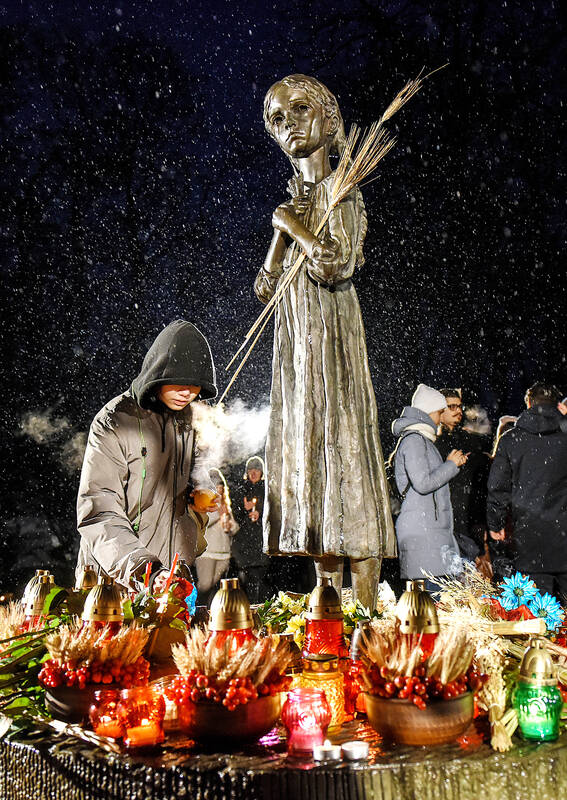Ninety years ago, millions perished in Ukraine in a manufactured famine under Soviet leader Joseph Stalin that many in the country call genocide.
For Ganna Pertchuk, the Russian invasion is a case of history repeating itself.
At the tall candle-shaped Holodomor (Ukrainian for death by starvation) memorial center in central Kyiv, a dozen Orthodox priests in black and silver robes on Saturday gathered for a religious ceremony for the victims of the famine.

Photo: EPA-EFE
The event was held outdoors despite sub-zero temperatures.
Before starting the ceremony, Ukrainian Orthodox Church Patriarch Filaret, 93, laid a wreath of red carnations at the monument with a statue of an emaciated girl clutching some stalks of wheat against her chest.
“We pray for those who perished in the famine,” he said. “The Holodomor was not a result of a bad harvest, but the targeted extermination of the Ukrainian people.”
“What happened in the 1930s was genocide and what is happening now is also genocide,” said Pertchuk, a pensioner, who attended the ceremony. “The parallels are very clear.”
Ukraine is known as the breadbasket of Europe for its abundant wheat crops, a product of its rich, black soil, but under Soviet rule it lost between 4 and 8 million citizens during the 1932-1933 famine. Some researchers put the figure even higher.
While some historians say that the famine was planned and exacerbated by Stalin to quash an independence movement, others say it was a result of rapid Soviet industrialization and the collectivization of agriculture.
Ukraine officially considers it a “genocide,” along with a number of Western countries, a label that Moscow vehemently rejects.
Pertchuk, like many Ukrainians has heard horror stories from family members.
Her mother-in-law, remembered as a young girl hiding with her family in a village near Kyiv so “that she wasn’t eaten up,” Pertchuk said, speaking of a famine that fueled rare cases of cannibalism.
“Imagine the horror,” the 61-year-old former nurse said, with tears in her eyes.
“It was an artificial genocidal famine,” priest Oleksandr Shmurygin, 38, said. “Now when we experience this massive unprovoked war of Russia against Ukraine, we see history repeating itself.” Among those gathered to commemorate the victims of the famine was lawyer Andryi Savchuk, who spoke of its “irreparable” loss for Ukraine.
“Stalin’s system, the repressive state, wanted to destroy Ukraine as a nation,” he said. “Today we see that the efforts made by Stalin are continued by [Russian President Vladimir] Putin.”
“At that time, they wanted to exterminate Ukrainians through famine. Today, they are exterminating us with heavy weapons,” Savchuk said.
However, just as Ukrainians held on in the 1930s, so they would against Moscow today, he said.
“We have an unyielding will and confidence, and the whole world is with us,” he said.

Asian perspectives of the US have shifted from a country once perceived as a force of “moral legitimacy” to something akin to “a landlord seeking rent,” Singaporean Minister for Defence Ng Eng Hen (黃永宏) said on the sidelines of an international security meeting. Ng said in a round-table discussion at the Munich Security Conference in Germany that assumptions undertaken in the years after the end of World War II have fundamentally changed. One example is that from the time of former US president John F. Kennedy’s inaugural address more than 60 years ago, the image of the US was of a country

BLIND COST CUTTING: A DOGE push to lay off 2,000 energy department workers resulted in hundreds of staff at a nuclear security agency being fired — then ‘unfired’ US President Donald Trump’s administration has halted the firings of hundreds of federal employees who were tasked with working on the nation’s nuclear weapons programs, in an about-face that has left workers confused and experts cautioning that the Department of Government Efficiency’s (DOGE’s) blind cost cutting would put communities at risk. Three US officials who spoke to The Associated Press said up to 350 employees at the National Nuclear Security Administration (NNSA) were abruptly laid off late on Thursday, with some losing access to e-mail before they’d learned they were fired, only to try to enter their offices on Friday morning

STEADFAST DART: The six-week exercise, which involves about 10,000 troops from nine nations, focuses on rapid deployment scenarios and multidomain operations NATO is testing its ability to rapidly deploy across eastern Europe — without direct US assistance — as Washington shifts its approach toward European defense and the war in Ukraine. The six-week Steadfast Dart 2025 exercises across Bulgaria, Romania and Greece are taking place as Russia’s invasion of Ukraine approaches the three-year mark. They involve about 10,000 troops from nine nations and represent the largest NATO operation planned this year. The US absence from the exercises comes as European nations scramble to build greater military self-sufficiency over their concerns about the commitment of US President Donald Trump’s administration to common defense and

Cook Islands officials yesterday said they had discussed seabed minerals research with China as the small Pacific island mulls deep-sea mining of its waters. The self-governing country of 17,000 people — a former colony of close partner New Zealand — has licensed three companies to explore the seabed for nodules rich in metals such as nickel and cobalt, which are used in electric vehicle (EV) batteries. Despite issuing the five-year exploration licenses in 2022, the Cook Islands government said it would not decide whether to harvest the potato-sized nodules until it has assessed environmental and other impacts. Cook Islands Prime Minister Mark Brown